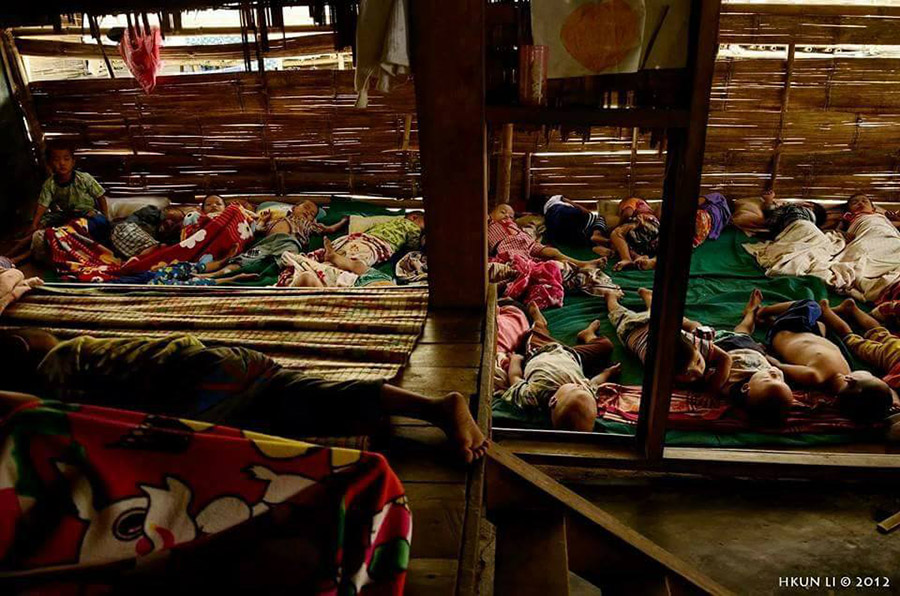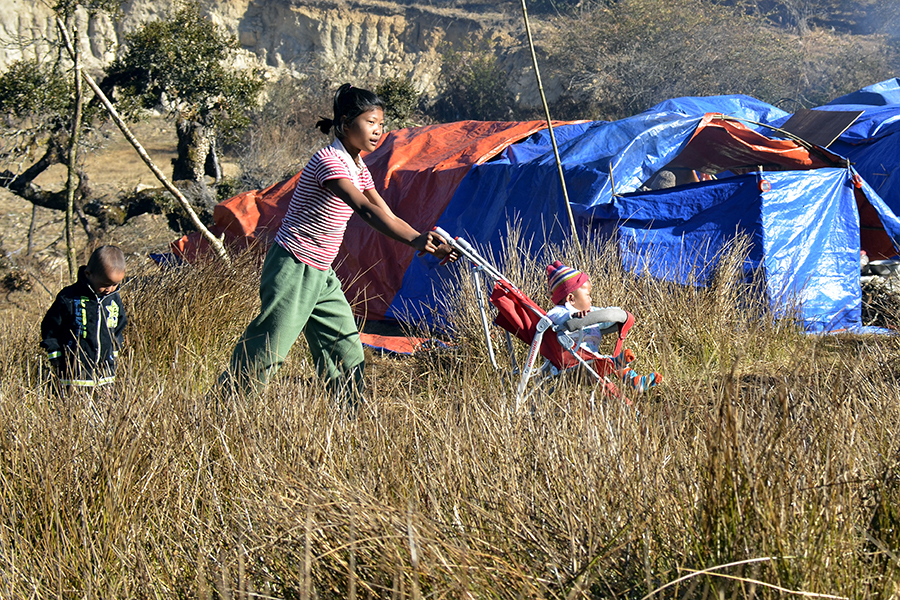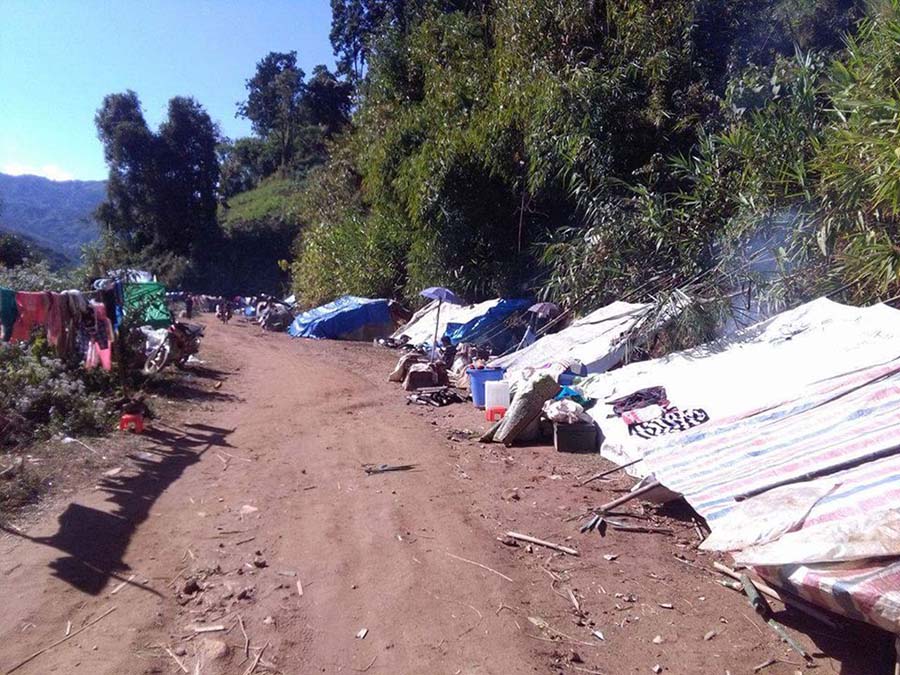As the sixth anniversary of the resumption of Burma’s civil war between the Burma Army and ethnic armed group the Kachin Independence Army (KIA) arrives, civilians in Kachin State continue to be displaced by conflict.
Immediately after the second session of the 21st Century Panglong peace conference ended, the Burma Army launched an offensive on KIA posts in Tanai Township, inhabited by tens of thousands of people who depend on mining gold and amber for their livelihoods. Many people have fled the conflict zone, some were injured and two died.
These new Internally Displaced Persons (IDPs) join more than 100,000 others in Kachin State—historically unprecedented numbers of displaced people in the area. The war not only produced tens of thousands of IDPs, but has taken the lives of combatants, civilians, and animals. Many villages have been devastated; paddy fields and farms turned to bushes.
The question “do Kachin IDP issues only matter to ethnic Kachin?” needs to be answered. Displacement creates social problems in a peaceful society and disrupts the state, the Union, and the economy.

The Problem of Unemployment
Civil war and displacement creates unemployment in Kachin, impacting GDP growth. According to the Asian Development Bank, Burma has one of the fastest GDP growth rates in the world at 7.7 percent, but its unemployment rate is still high at 4.02 percent. By comparison, Cambodia’s unemployment rate is 0.3 percent, Thailand’s 0.9 percent, Laos’ 1.3 percent, and Vietnam’s 3.7 percent.
Farm workers, fishermen, and hunters quit their jobs for fear of conflict when traveling in the region. They often become porters to support troops instead. Residents increasingly turn to opium poppy cultivation and drug dealing as a quick way to make money. Instability and unemployment has led to a low standard of living and an increase in violent crime.
A 2015 report by the UN Office on Drugs and Crime reported Kachin State is one of the largest poppy growing areas in the region with 2,000 hectares under cultivation. Unsurprisingly, in some villages, an estimated 20 percent of households deal drugs. High unemployment and opium cultivation breeds drug addiction, particularly among youth. The cycle of unemployment, drug dealing, addiction, and crime will not only impact Kachin, but the country’s society at large.
Loss of Trade
Kachin’s major trading partner is China’s Yunnan province, and a major trade route, passing through KIA headquarters in Laiza, has been shut down by conflict. It is the same story for the Lweje trade route. The Kanpaiti trade route was opened as a replacement, but the road is not as good and is longer. It is fair to say that war in Kachin has negatively affected cross-border trade between China and Kachin, and therefore Burma.
The railway between Kachin and Mandalay via Sagaing has been affected by clashes along its course, disrupting domestic trade and pushing up the price of daily commodities which are imported by train to Kachin State. Trade between state capital Myitkyina and the far north’s Putao has also been halted by fighting. In 2012, an acute rice shortage was only alleviated when the government delivered sacks of rice to hungry villagers. Prices in Putao are often double, if not triple, those in the capital.
It’s not just trade of day-to-day necessities that has been disrupted by war—the trade of natural resources including gold, amber, and jadeite have also been affected, naturally affecting the state’s GDP.

Brain Drain
The civil war has driven people in Burma to seek better opportunities abroad. According to the International Organization for Migration, 4.25 million out of Burma’s 51.9 million population are now living abroad. Regionally, Burma has grown to be the largest migration source country in the Greater Mekong sub-region. Among them, 70 percent of migrants living abroad are based in Thailand, followed by Malaysia (15 percent), China (4.6 percent), Singapore (3.9 percent) and the USA (1.9 percent).
Although there is no specific data on a “brain drain” of workers from Kachin State, an estimated one person in ten is now working in a foreign country—China, Thailand, Malaysia, Singapore, Japan, and others. Most initially work in Malaysia and Thailand before seeking asylum in third countries such as Australia, the US, and Europe. This loss of labor undermines productivity in Kachin and the country.
Forlorn Hope
Despite the six-year anniversary of the civil war, the mounting number of IDPs maintain a forlorn hope for resettlement. The miserable IDP camps face increasing cuts to aid. According to Human Rights Watch, the Burma Army has blocked World Food Program aid since mid-2016 for fear that it could be used to supply KIA troops. Food rations for able-bodied men in IDP camps were cut in March 2017, according to camp organizers.

Burma Army Commander-in-Chief Snr-Gen Min Aung Hlaing upset many Kachin last month when he accused “insurgents” of using IDPs as human shields in a conversation with International Committee for the Red Cross President Peter Maurer.
State Counselor Daw Aung San Suu Kyi—who initially fostered hopes of peace from voters including ethnic minorities—gave IDPs little hope of resettlement when she visited Kachin camps in March this year. “We can close these IDP camps and people can live in their homes only if we attain peace,” she said. Gaining peace seems a long way off for IDPs and their dream to return home remains blurry—they have no alternative but to wait.
Now is not time for Burma’s government to increase military spending, but rather to provide aid to IDPs, curtail unemployment, and rebuild communities in Kachin State and elsewhere. The Burma Army and ethnic armed groups should not argue over secession from the Union—as they did at the recent peace conference—but rather seek solutions to end conflict and build lasting peace in the region.
The international community, particularly China, must help Burma to end its civil war not just in the interest of border stability, but for the livelihoods of those displaced by conflict. China should not be shy in stepping in to solve the conflict—getting fully involved in order to achieve peace is preferable to being overly cautious and muddling through. Without attempts to broker peace, IDPs will be waiting beyond the seventh anniversary of civil war before they can return home. No one wants that.
Joe Kumbun is the pseudonym of a Kachin State-based analyst.
















